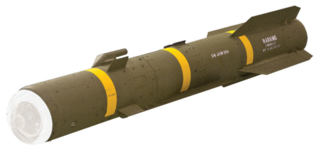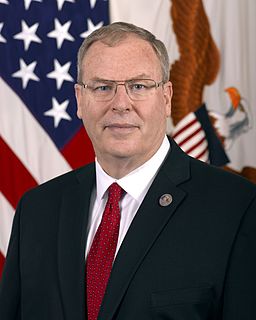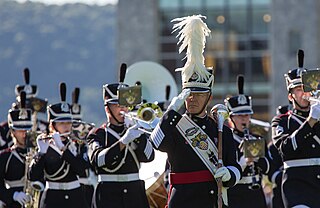
Louis Arthur Johnson was an American politician and attorney who served as the second United States Secretary of Defense from 1949 to 1950. He was the Assistant Secretary of War from 1937 to 1940 and the 15th national commander of the American Legion from 1932 to 1933.

"Taps" is a bugle call played at 2100 hrs during flag ceremonies and at military funerals by the United States Armed Forces. The official military version is played by a single bugle or trumpet, although other versions of the tune may be played in other contexts. It is also performed often at Girl Guide, Girl Scout, and Boy Scout meetings and camps. The tune is also sometimes known as "Butterfield's Lullaby", or by the first line of the lyric, "Day Is Done". The duration may vary to some extent.

A military band is a group of personnel that performs musical duties for military functions, usually for the armed forces. A typical military band consists mostly of wind and percussion instruments. The conductor of a band commonly bears the title of Bandmaster or Director of Music. Ottoman military bands are thought to be the oldest variety of military marching bands in the world, dating from the 13th century.

A concert band, variously also called a wind ensemble, symphonic band, wind symphony, wind orchestra, wind band, symphonic winds, symphony band, or symphonic wind ensemble, is a performing ensemble consisting of members of the woodwind, brass, and percussion families of instruments, and occasionally including the double bass or bass guitar. On rare occasions, additional non-traditional instruments may be added to such ensembles such as piano, harp, synthesizer, or electric guitar.

Howard Philip "Buck" McKeon is an American politician who served as a U.S. Representative from California's 25th congressional district from 1993 to 2015. He is a member of the Republican Party. He is a former chairman of the House Armed Services Committee and the House Education Committee.
The military budget is the largest portion of the discretionary United States federal budget allocated to the Department of Defense, or more broadly, the portion of the budget that goes to any military-related expenditures. The military budget pays the salaries, training, and health care of uniformed and civilian personnel, maintains arms, equipment and facilities, funds operations, and develops and buys new items. The budget funds five branches of the U.S. military: the Army, Navy, Marine Corps, Air Force, and Space Force.

The United States Marine Band is the premier band of the United States Marine Corps. Established by act of Congress on July 11, 1798, it is the oldest of the United States military bands and the oldest professional musical organization in the United States. Today, the Marine Band also includes the Marine Chamber Orchestra and Marine Chamber Ensembles.

United States military bands include musical ensembles maintained by the United States Army, United States Marine Corps, United States Navy, United States Air Force, and United States Coast Guard. More broadly, they can also include musical ensembles of other federal and state uniformed services, including the Public Health Service and NOAA Corps, the state defense forces, and the senior military colleges.

The United States Department of Defense is an executive branch department of the federal government charged with coordinating and supervising all agencies and functions of the government directly related to national security and the United States Armed Forces. The DOD is the largest employer in the world, with over 1.4 million active-duty service members as of 2021. More employees include over 826,000 National Guard and reservists from the armed forces, and over 732,000 civilians bringing the total to over 2.8 million employees. Headquartered at the Pentagon in Arlington, Virginia, just outside Washington, D.C., the DoD's stated mission is to provide "the military forces needed to deter war and ensure our nation's security".

The AGM-179 Joint Air-to-Ground Missile (JAGM) is an American military program to develop an air-to-surface missile to replace the current air-launched BGM-71 TOW, AGM-114 Hellfire, and AGM-65 Maverick missiles. The U.S. Army, Navy, and Marine Corps plan to buy thousands of JAGMs.

A Corps of Drums, also sometimes known as a Fife and Drum Corps, Fifes and Drums or simply Drums is a unit of several national armies. Drummers were originally established in European armies to act as signallers. The major historical distinction between a military band and a corps of drums, was that 'drummers' were not employed to play their instruments to entertain or delight, but rather they carried out a utilitarian battlefield role. This role was fulfilled by trumpeters or buglers in the cavalry and the artillery, who did not form into comparative formed bodies in the way that drummers did; therefore, an orthodox corps of drums will exist in the infantry arm.

Robert Orton Work is an American national security professional who served as the 32nd United States Deputy Secretary of Defense for both the Obama and Trump administrations from 2014 to 2017. Prior to that, Work was the United States Under Secretary of the Navy from 2009 to 2013, and before that served as a colonel in the United States Marine Corps; Work retired in 2001 and worked as a civilian at the Center for Strategic and Budgetary Assessments (CSBA) and the George Washington University in various positions relating to military and strategic study. From 2013 to 2014, he was the CEO of the Center for a New American Security (CNAS).

A drum major in the military refers to someone who is the individual leading a military band or a field unit. It is an appointment, not a military rank. Military drum majors utilize a ceremonial mace for giving commands while marching. Many drum majors wear a sash that can carry embroidered badges of their home unit and battles honors, and a pair of ceremonial drum sticks are often attached.

The West Point Band is the U.S. Army's oldest active band and the oldest unit at the United States Military Academy, traces its roots to the American Revolutionary War. At that time, fifers and drummers were stationed with companies of minutemen on Constitution Island, across the river from West Point. In 1778, General Samuel Holden Parsons' 1st Connecticut Brigade crossed the Hudson River and established West Point as a permanent military post. After the American Revolution, Congress disbanded most of the Continental Army, but "the 55 men at West Point", members of the 2nd Continental Artillery, remained as they were. Among their ranks stood at least one drummer and one fifer, who alone maintained the tradition of military music at West Point.

United States military music customs are the traditional, regulatory, and statutory provisions that guide performances by United States military bands during drill and ceremony and state occasions.

The United States Air Force Academy Band is a United States military band based out of Peterson Air Force Base near Colorado Springs, Colorado. Despite the fact that it provides musical support to the USAFA Cadet Wing, it is an active duty full time band. The USAFA Drum and Bugle Corps on the other hand is staffed by cadets of the academy. The band, like many other USAF bands, performs in a distinctive ceremonial dress, which includes a choker-style collar, and silver-braided epaulettes. It is one of two premier ensembles in the air force, with the other being the United States Air Force Band. The band was raised in 1955, shortly after the foundation of the academy.

The United States Air Force Academy Drum and Bugle Corps also known as the Flight of Sound is the drum and bugle corps of the United States Air Force Academy and a military band in the United States Armed Forces. Unlike United States Air Force Academy Band, the drum and bugle corps is staffed by USAFA cadets from the Cadet Wing. 80 cadets make up the band, with 60% of the members being from the freshman class. The two bands perform in different uniforms, with the former wearing the full dress uniform of the United States Air Force while the latter wears the standard cadet uniform. Compared to the United States Marine Drum and Bugle Corps, it is not a full time band.

The United States Naval Forces Europe Band is the musical component of the United States Naval Forces Europe - Naval Forces Africa, a subordinate command of the United States European Command and United States Africa Command. It acts as the de facto American musical unit for Europe. As a United States Navy band, it is part of the Navy Music Program. Currently stationed in at Naval Support Activity in Naples, Italy, it operates under the direct control and supervision of the Commander of NAVEUR.

The United States Naval Academy Drum and Bugle Corps is the military band and drum and bugle corps of the United States Naval Academy, which is a federal service academy in the United States Armed Forces based Maryland. Like its counterpart at the Air Force Academy, it is staffed by midshipmen from the Brigade of Midshipmen. It provides support to the brigade as well as the Plebe Summer Regiment. It is the oldest continuously active drum and bugle corps in the United States. It currently performs over 100 times per year.





















